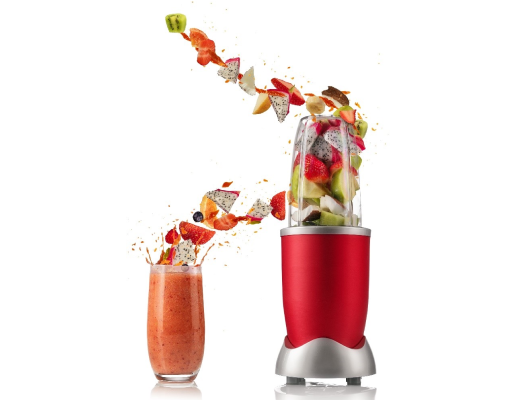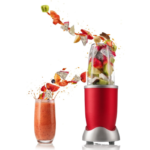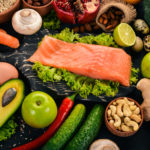
I don’t like to eat smoothies all the time – they come and go from my diet. I like to use them as an opportunity to get something specific into my diet (like more resistant starch, antioxidant berries or gelatin for gut-healing), or as a meal replacement that cuts down on the overall calories I’m eating, or the amount of animal protein, specifically.
Smoothies are very forgiving, so I won’t give a specific recipe, just ideas below for what to add. Any blender will do, although I go through phases where simply mashing ingredients together with a fork or spoon leaves a chunky mess that seems to taste more interesting than homogenizing everything – variety is key!
The smoothie base:
- Banana, as long as you don’t have glucose management issues or aren’t eating keto. Good for adding fiber and potassium if you are active.
- Organic Berries: blueberry, strawberry, blackberry, raspberry – any berry, and the more variety the better (our gut microbes love variety). Frozen are just as good as fresh, as frozen fruits are often picked at mature ripeness with higher levels of polyphenols. If you are eating keto, berries are the way to go.
- Avocado is a great alternative to bananas or yogurt, or if you are eating keto. It provides healthy fat, significant fiber and adds a satisfying pudding-like texture to a smoothie. It tends to make things taste blander, so I use a bit of creativity to offset that with other ingredients.
- Roasted butternut squash disguised as pumpkin. Once in a while, I roast a butternut squash, let it cool and add some pumpkin-pie spices including ginger as the base of a fall-harvest-inspired smoothie treat.
- Mangoes, Pineapple, Pomegranate seeds, Peaches, Nectarines, Cherries.
- Yogurt or kefir if full-fat and made from organic dairy – if well tolerated. If you notice a difference in ability to digest, or feeling more full than normal, be careful with dairy and consider using coconut or nut-milk substitutes or plain water.
- Coconut milk (from a BPA-free can)
- Coconut yogurt can be a great alternative but beware of store-bought products that contain starches and other fillers to thicken coconut yogurt: corn, rice and other starches, pectin (sugar), anything “modified”, various gums (carob bean gum, guar gum, xanthan gum). These may not be all that bad, but when I started making my own coconut yogurt, I realized that the thickeners unnecessarily create a “processed” food. Unless you are lucky enough to find GT’s ‘Cocoyo’ (only uses coconut and bacteria culture), I would make your own using organic coconut milk and yogurt starter powder – look for my recipe or research online.
The supporting cast of ingredients:
- Hemp Hearts add a richness and smoothness when blended.
- A few cashews or macadamias can add texture – but I would only use these if already not eating many nuts in your diet.
- Chia seeds, just for their nutrition, sometimes.
- Inulin powder or FOS adds a bit of sweetness and texture along with its high resistant starch (no calorie) content. Give those healthy bacteria in the large intestine the food they crave.
- Collagen protein powder adds high quality protein while also helping you reap the many benefits of collagen. I usually don’t add any other protein beyond collagen (whey and plant protein are more processed).
- Whey protein can be used for those that tolerate it well (watch for digestibility) and adds a lightness or fluffy texture to the mix.
- Plant-based protein can also be used in place of whey if you are looking to add protein to your diet. Vege Pro 7 by North Coast Naturals is a good brand to consider.
- Gelatin! I often dissolve a tbsp of gelatin by mixing it with a couple of tbsp of cold water, then adding hot water mixing slowly before adding to the mix. It will bloom as it cools with ice or frozen berries thickening the smoothie into a pudding texture in seconds. This can be beneficial in supporting gut repair.
Superfood / Seasonings:
- Bee-Pollen adds high-quality protein.
- Superfood supplement powders (superfood berries, pomegranate peel, vegetable greens and the like) add gut-friendly polyphenols; or the rare tuber or vegetable powders such as maca, lucuma, mesquite etc.
- MCT oil, coconut oil, and other healthy oils.
- Stevia drops or powder to sweeten. You may consider raw honey or the sugar alcohols (xylitol, erythritol, monk fruit) if well tolerated.
- Vanilla extract or whole beans.
- Raw or roasted cacao.




Leave a Reply